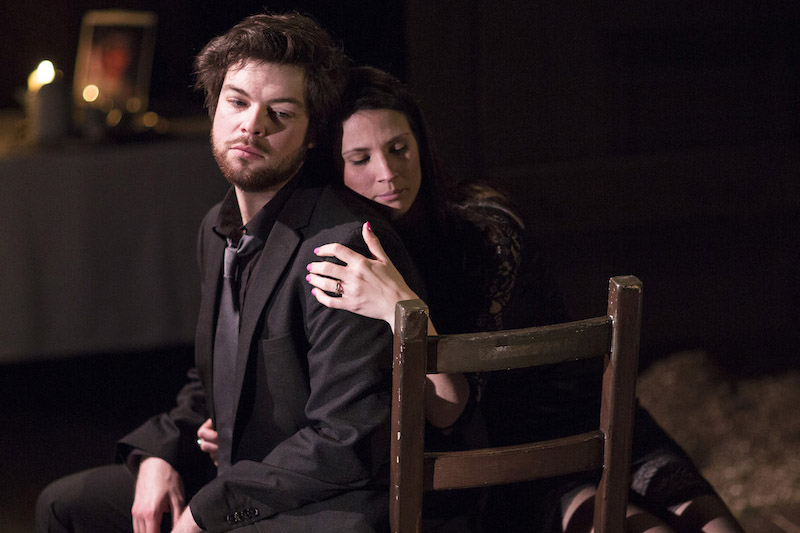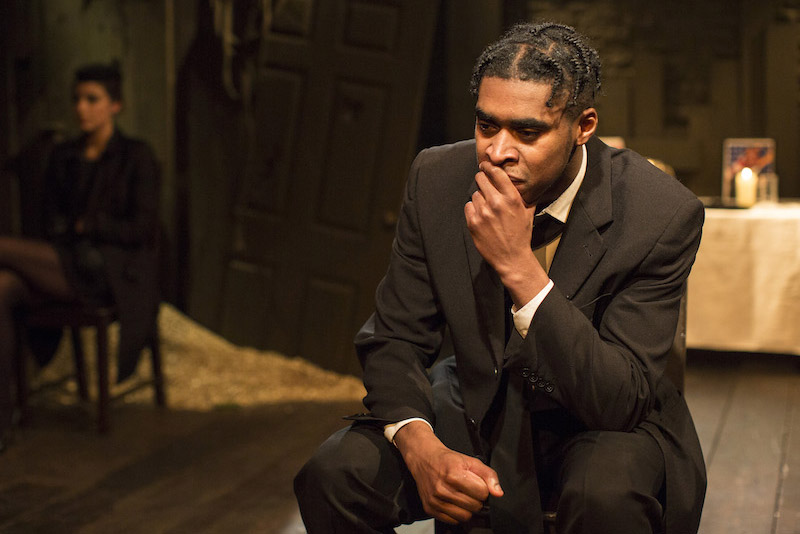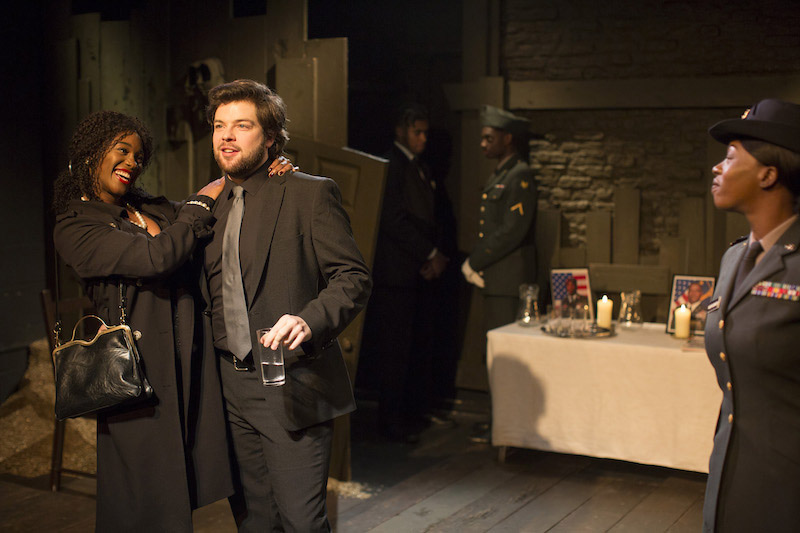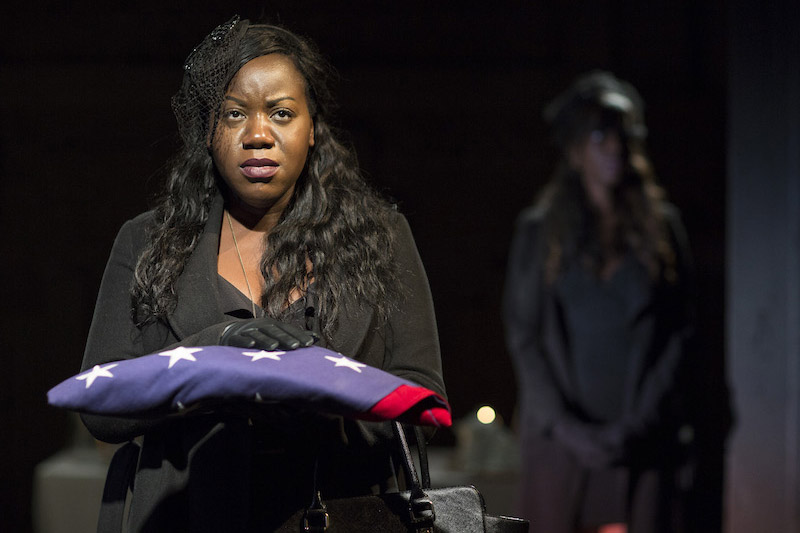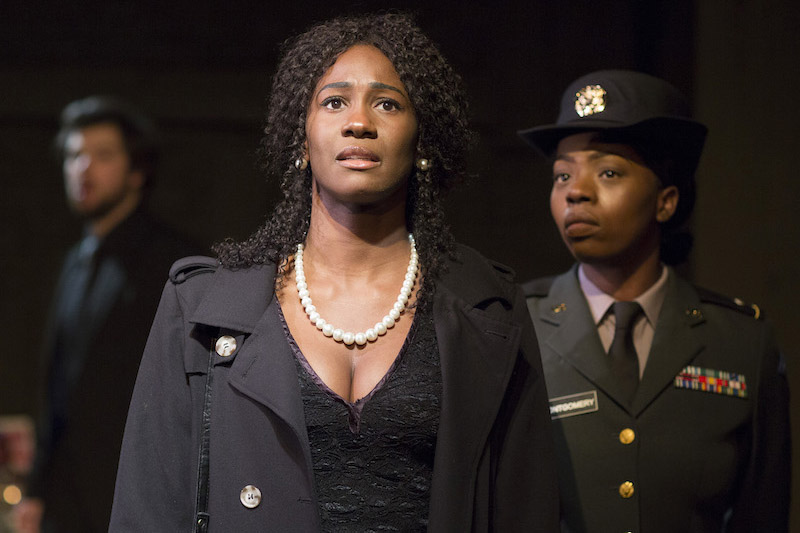At a time when the United States’ volunteer army is stretched to breaking point, Glockenspiel explores the war on the home front, the alliances formed by those left behind and the sense of betrayal and rage that undermines trust, support and hope.
At a time when the United States’ volunteer army is stretched to breaking point, Glockenspiel explores the war on the home front, the alliances formed by those left behind and the sense of betrayal and rage that undermines trust, support and hope. While tackling issues of race, class and sex, the play also celebrates the humour and spirit of ordinary people trapped in an extraordinary situation.
In an American town we witness three funeral ceremonies for which the deceased have been granted military honours. As we meet the relatives we discover that none of the dead has been killed on active duty and that the inglorious nature of their deaths prevents the families from truly coming to terms with their loss.
A single mother struggles to make sense of her daughter’s death in an ‘accident’ on base, while her oldest friend finds that far from bonding over the tragedy, she is further alienated from her community.
A young widow mourns her veteran husband’s suicide, still unable to end her affair with her sister-in-law’s fiancé.
The sudden death of a retired colonel leaves his army-officer daughter distraught and at loggerheads with his second wife, a woman of her own age.
And a funeral home assistant must hide his own demons as he clings to a new job on being discharged from the military.
At a time when the United States’ volunteer army is stretched to breaking point, Glockenspiel explores the war on the home front, the alliances formed by those left behind and the sense of betrayal and rage that undermines trust, support and hope.
While tackling issues of race, class and sex, the play also celebrates the humour and spirit of ordinary people trapped in extraordinary situations.
– The Pentagon has a budget fourteen times that of the State Department (and a third more personnel) and yet the US Military has been reduced by over a third in the last twenty five years (in terms of enlisted servicemen and women).
– Because the number of ‘active’ troops is smaller, military personnel are sent on repeated tours to meet the demands of extended conflicts in Iraq and Afghanistan.
– 40% of current military service members have been deployed more than once; 263,150 service members have served more than two tours.
– Families have little warning of deployments, which often extend beyond originally stated durations. Official military policy is 2 years of dwell time (service at home) for every year of active duty (overseas.). [But] average dwell times are substantially shorter than the established policy.
– The wars in Iraq and Afghanistan have seen a growing reliance on the National Guard, reserves and older, married soldiers, creating a new array of concerns related to family-life readjustment and the well-being of older children.
– The proportion of service members who have been killed or wounded in Iraq and Afghanistan has been lower than that in past conflicts. The lower number of fatalities is attributable to improved body armor and emergency medical care. But it means more service members survive to return home with severe combat-related injuries that require additional care.
– About 27% of those who have been deployed three or four times have received diagnoses of depression, anxiety, or acute stress.
– Another troubling consequence of extended deployment is the increase in the number of suicides. Historically, the suicide rate has been lower in military members than in civilians. The US National Violent Death Reporting System now indicates that male veterans have a suicide rate twice that of the general population.
– Diagnoses of alcoholism and alcohol abuse have more than doubled since 2003.
– 20% of recent veterans are unemployed, and 25% of those who are employed earn less than $21,000 per year.
– Veterans have been pursued for repayment of military debt, such as unpaid expenses for lost or damaged equipment, medical services, household moves, insurance premiums, and travel advances – incurred through no fault of their own.
– Recent data from the Army shows an overall increase in the number of divorces since the start of the Afghan and Iraq conflicts, especially in female soldiers.
– Domestic violence affects 20% of military couples in which the service member has been deployed for at least 6 months
– There is a stigma seeking treatment for mental health. Many consider it a “stripe-killer.”
Statistics drawn from: Returning Home from Iraq and Afghanistan: Preliminary Assessment of Readjustment Needs of Veterans, Service Members, and Their Families National Academies Press (Washington DC, 2010)
“Military life isn’t for everyone. Even in peacetime, it puts a lot of strain on not only the serviceman or woman but also their family and friends. In a time of conflict, that strain gets even more intense. This gets worse if the service man/woman doesn’t fully believe in the cause and justness of the action they are being ordered to take. However, possibly the most difficult part of military life is when it ends. After a lifetime of service, adjusting to civilian life can be traumatic, to say the least. All of these themes and more are examined in Steven Dykes Glockenspiel at Soho’s Tristan Bates Theatre.
Terry EasthamLondonTheatre1.com, 6 January 2017
To describe Glockenspiel as hard-hitting would be to understate this powerful play that examines so much aside from the obvious military angle to the various people’s lives. I liked the fact that Playwright/Director Steven Dykes actually allowed the audience to see both sides of the argument of the discussion on the need for the military. The writing was also interesting for two other points from my perspective. The first was that all three of the funerals were for members of the BME community – who make up around 30% of the American armed forces whilst being only 22% of the American population overall – and included mixed race relationships both accepted and resented. The second is that the term “War on Terror” was first coined in September 2001 which means that come next year, there will be members of the various military forces taking part in a conflict that began before they were born. Food for thought.
Glockenspiel tells the story of the funerals of three current and former members of the American armed forces. Whilst none of the deceased died on active service, they are all entitled to and receive a military funeral. At each, the Defence Department has supplied an Honour Guard, who are there to represent the people of the USA and hand over the flag that was draped over the coffin. The funerals are very different. Single mother Debra attends the service of her daughter with her friend Yolanda. Eloise is coming to terms with the suicide of her husband, whilst keeping a secret from her sister-in-law Zinnie and her partner, Professor Josh. And finally, Justine, the young widow of a retired colonel must face the disapproval of his daughter who blames her for the death of her father. The funerals are overseen by undertaker Andre an ex-military man with demons of his own to face.
Overall Glockenspiel is a very deep, multi-layered production that is gripping in its writing and presentation. It left me really moved and thoughtful as I considered the plight not only of those that protect us day and night but the other people in their lives for whom the news is not just some happenings in far flung places but in fact something that will have an effect on them forever.”
”Plays about the aftermath of death, especially for soldiers and people who commit suicide carry with them a certain level of expectation in terms of gravitas and weight of responsibility. On the surface, Old Sole Theatre Company’s Glockenspiel sounds like it might be like Bruce Norris’ Purple Heart... But Glockenspiel is very much its own thing. As if to acknowledge the enormity of the task ahead, the play doesn’t jump straight into the heart of the story, but takes its time. Several sets of people are introduced whose stories over the course of the play dovetail into each other and with those of the serviceman whose lives they are mourning – an emotional version of La Ronde.
Michael DavisBreaking The Fourth Wall, January 2017
Introducing the theme of disconnection from those supposedly closest to us, we meet health care professional Debra and her once-close friend Yolanda. Across town, assistant professor Josh and his wife Zinnie are getting ready for her brother’s funeral. While Josh repeatedly feels the need to apologise for not being gentle in bed the night before, Zinnie’s thoughts are understandably elsewhere. Both Zinnie and Yolanda find solace at the funerals talking to two people involved with the funeral preparations, but not part of their circle of friends: Andre, a funeral director’s assistant and Carmen – an honour guard who takes part in the folding of the US flag at funerals for (ex-)military personnel. While initially the nexus between all the characters in the play, they have their own story to tell too, illuminating certain events.
If the first half of the play takes its time with the introduction of characters, the second half dives head first into the messy lives of the mourners, proving that ‘grief’ makes strange bedfellows – a certain amount of ‘sleeping with the enemy’. While the unseen deceased soldiers endured mixed fortunes upon leaving the military, they made an impact, for better or worse, on those closest to them. Eloise felt like a widow long before her husband’s actual death, as she felt he left an important part of himself behind in the theatre of war. So she looks for ‘solace’ elsewhere. Conversely, widow Justine initially met her husband when she was a journalist and he was a decorated officer. Far from driving them apart, the military campaigns brought them closer together, with Justine able to understand at some level the things her husband wrestled with and give him the courage to leave. Of all the characters written, the one that is the most complicated and makes the longest impression is Carmen. While her vehemence to extoling the virtue code and honour in the military would fit right in A Few Good Men, her objections to the decisions her father made (to leaving the military) are more akin in spirit to Brabantio in Othello, who questioned whether the Moor seduced Desdemona or vice versa.
Glockenspiel is an ambitious play and tries to dovetail three very different takes on the circumstances of serviceman and their respective loved ones. Each pair of characters could have had a play solely written about them, dealing with their specific predicaments.
“The hidden casualties of war are given a voice in Steven Dykes well-acted, uncompromising war drama.
Anne Coxwww.stagereview.co.uk, 6 January 2017
There’s a feeling of familiarity and deja vu with Glockenspiel, which opened at London’s Tristan Bates Theatre last night. The play, set in modern-day America during the conflict in Iraq and Afghanistan, condemns a country’s lack of support to its troops once they complete their tours of duty. It proves, if nothing else, that the US has learned nothing since engaging in the Vietnam War 60 years ago. But it also strikes a chord with us because exactly the same situation is happening in the UK. Young men and women are tempted into the armed services with bribes of vocational training and offers to pay university fees, only to find that you’re on your own once you are out.
“This flag is presented on behalf of a grateful nation as a token of appreciation for your loved one’s honourable and faithful service.” A guard hands over an immaculately folded flag to the relatives of the deceased. It ought to be a moment of pride. Instead Glockenspiel seethes with anger and indignation at the waste of life.
The play isn’t about those lost in battle but a trio of characters who died before and after serving their country, in ways that were preventable and unnecessary. Debs gets ready for a funeral. She gabbles on to Yolanda about people and situations that YoYo knows nothing about since she long fled her childhood home. The brave Debra talks to deflect the pain. We hear her story, and those of the others involved, drip-fed throughout the play. Her loved one died, without seeing combat, in a hospital bed after a reaction to a vaccination given. Shockingly, we hear, all 1.5m active personnel are given shots with one person in 10,000 dying as a result. It is considered acceptable collateral damage. Who knew? A marine struggles with PTSD, another kills himself, while a third dies during “active” service. Only one person, Zinnie, rails against the war while Carmen explodes with unbridled rage at those opposing military intervention. She’s army through and through.
Glockenspiel is a well told story, with strands from four groups of people knitted together through the framework of death, rites and rituals. The dialogue is funny, intense, emotional and filled with outrage, dignity and incredulity. The performances from this engaging ensemble of nine young and rising stars doesn’t disappoint.
The compelling Glockenspiel raises a lot of questions while drawing you into the lives of a group of ordinary people affected by extraordinary circumstances. Not all victims, it seems, die on the battlefield.”
”The compelling Glockenspiel raises a lot of questions while drawing you into the lives of a group of ordinary people affected by extraordinary circumstances. Not all victims, it seems, die on the battlefield.
Anne Coxwww.stagereview.co.uk
GALLERY
Photographs from the 2017 London production.
LATEST NEWS
Check out the latest updates about performances of this play.

